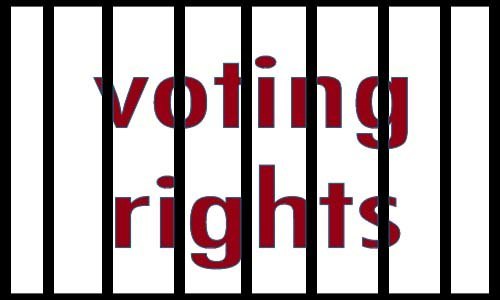
Dangerous New Campaign of Voter Intimidation Unmasked by Democracy Groups With Worrying Warning
Democracy, elections and voting at Democracy Chronicles
Strong Enforcement Of Voter Protections Needed To Stop “Bullies At The Ballot Box”
New study grades states’ ability to counter partisan poll watchers and wrongful voter challenges
NEW YORK, As the elections approach, strong enforcement of voter protections is needed to prevent attempts to block voters from casting their ballot, according to a report released today by voting rights groups Demos and Common Cause. The study, “Bullies at the Ballot Box: Protecting the Freedom to Vote from Wrongful Challenges and Intimidation” focuses on voter protection laws in 10 states where elections are expected to be close, or where large challenger operations are expected or have taken place during recent elections.
True the Vote and other Tea Party-affiliated groups are reportedly recruiting 1 million volunteers to object to the qualifications of voters in targeted communities on and before Election Day, according to the study. These volunteers are being rallied to block, in their own words, the “illegal alien vote” and “the food stamp army.” Their stated goal is to make the experience of voting “like driving and seeing the police behind you.”
“Ballot box bully” tactics include:
- Targeting registered voters in communities of color, student voters, and voters facing foreclosure to challenge their eligibility to vote and kick them off the voting rolls.
- “Hovering over” voters waiting to cast their ballots and otherwise intimidating voters at the polls.
- Encouraging states to engage in systematic purges of voter rolls, in violation of federal law.
“Voting must be free, fair and accessible to all, and voters should know their rights,” said Common Cause President Bob Edgar. “It is important to maintain the integrity of our election system, and that means that candidates, parties and political activists should be focused on persuading and turning out voters, not bullying them or trying to manipulate the law to freeze them out of our democracy.”
The ten states reviewed in “Bullies at the Ballot Box” are Colorado, Florida, Missouri, Nevada, New Hampshire, North Carolina, Ohio, Pennsylvania, Texas and Virginia. In addition to assessing the current state laws, the report provides recommendations to protect citizens from these large-scale, well-organized efforts to intimidate or block them from voting.
“We call on elections officials and law enforcement at the state and federal level to stand ready to enforce the law and aggressively protect every eligible American’s right to vote this November,” said Liz Kennedy, report co-author and Counsel at Demos. “Wrongful challenges and intimidating tactics should never stand between Americans and their right to have their voices heard on the issues that affect their lives. There should be zero tolerance for bullying at the ballot box.”
Findings
The report grades the level of protection that state law provides eligible voters in three major categories – challenges to voters’ right to vote before Election Day, on Election Day, and laws governing the conduct of poll watchers or other observers at the polls. While every state has room for improvement, the authors find that:
As for challenges to voters’ registration status and right to vote before Election Day:
- Colorado, Nevada, and Ohio laws are satisfactory;
- North Carolina and Texas laws are mixed as to the level of protection they afford voters but could be improved; and
- Florida, Missouri, New Hampshire, Pennsylvania, and Virginia (half of the states examined) have unsatisfactory laws on the books.
As for challenges to a voter’s right to vote on Election Day:
- Texas (which does not allow any Election Day challenges), Ohio, Colorado, New Hampshire, and North Carolina laws are satisfactory.
- Missouri, Nevada, and Virginia laws are mixed in the level of protection they afford voters; and
- Florida and Pennsylvania have laws with unsatisfactory protections to guard against inappropriate Election Day challenges to voter eligibility.
As for state laws governing poll watchers or observer conduct at the polls:
- Colorado, Nevada, North Carolina, Ohio, and Virginia laws are satisfactory;
- Florida, Missouri and New Hampshire are mixed in the level of protection they afford voters; and
- Pennsylvania and Texas allow behavior by poll observers and poll watchers that is problematic and could intimidate voters, so their laws were assessed as unsatisfactory.
The report cites federal law and laws on the books in all ten states that prohibit voter intimidation and could be enforced to prevent harassing conduct at the polls.
“It is important that all participants understand the rules and respect the right of all eligible Americans to vote free of intimidation or obstruction. We want to minimize the risk of positive civic engagement moving into disrupting the orderly conduct of elections,” said Liz Kennedy. “Unwarranted challenges to voters’ eligibility can lead to problems at the polls for everyone seeking to cast a ballot by depleting resources, distracting officials, and leading to longer lines. They threaten the fair administration of elections and the fundamental freedom to vote.”
“Voting is one of our most fundamental rights,” said Common Cause’s Edgar. “No eligible voter should be blocked from casting a ballot, and the entire voting rights community is mobilized to protect voters’ rights.”
Common Cause and Demos are part of the Election Protection coalition, the nation’s largest non-partisan voter protection coalition. Common Cause and coalition allies are recruiting and organizing non partisan Election Day monitors to help voters understand the voting rules in their state and report any and all efforts to discourage or intimidate voters. Through the 1-866-OUR-VOTE hotline and a comprehensive field deployment, Election Protection helps voters overcome obstacles to the ballot box while collecting data for meaningful reform. Over 100 organizations have joined forces to monitor polling places across the country and provide aid, including legal assistance, to voters who encounter obstacles to voting.
SOURCE Common Cause
Leave a Reply